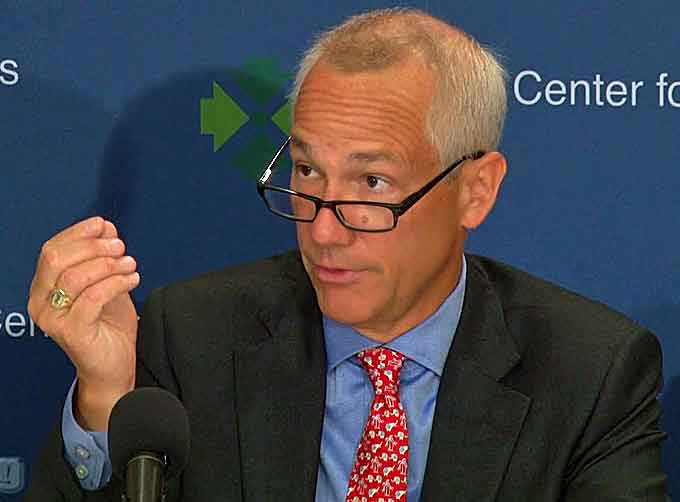
By Andrew R. Arthur, the Center for Immigration Studies (CIS)
Yesterday I discussed the latest caravan of migrants from Honduras making their way to the United States, and the president’s threats to cut off aid to that country if the caravan were not stopped and returned.
Fox News has reported that the president has most recently threatened to cut off aid to not just Honduras, but also Guatemala and El Salvador, “if they allow their citizens, or others, to journey through their borders and up to the United States, with the intention of entering our country illegally.”
Those threats seem to be having an effect.
(As about 3,000 Hondurans made their way through Guatemala, attention — and pressure — turned to Mexico Thursday, after U.S. Courtesy of TIME and YouTube. Posted on Oct 18, 2018.)
Specifically, the network reported that Bartolo Fuentes, a former Honduran legislator who is purportedly one of the organizers of that caravan, had been detained by authorities in Guatemala with two other individuals after he failed to register with Guatemalan migration officials after entering.
Fuentes was thereafter reportedly “taken to a migration shelter and deported.”
(According to Reuters, the organizer of a caravan of hundreds of migrants traveling north on foot from Honduras was detained Tuesday morning in Guatemala. Three Guatemalan police officers reportedly zeroed in on Bartolo Fuentes, a former lawmaker in the Honduran Congress, and detained him. Fuentes was in a crowd of several hundred people that he and three other Hondurans had led from San Pedro Sula, Honduras, since Saturday, bound for Mexico. Courtesy of Wochit News and YouTube. Posted on Oct 16, 2018.)
According to the Associated Press, Guatemala on October 16 also closed the migration facilities at the Agua Caliente border crossing, in order to prevent other Hondurans from entering the country.
AP further reports that the Honduran government has issued a statement, which refers to the caravan as an “irregular mobilization”, and asserts that it is “obviously political and seeks to upset governability, stability and peace in Honduras and the United States.”
The Department of Homeland Security (DHS) is putting the blame for the caravan directly where it belongs: on border laws in the United States that are being exploited by aliens entering illegally.
According to USA Today:

Katie Waldman, a [DHS] spokeswoman, said in a statement that the caravan was “what we see day-in and day-out at the border as a result of well-advertised and well-known catch-and-release loopholes.”
“As we have said time and again, until Congress acts, we will continue to have de-facto open borders that guarantees future ‘caravans’ and record numbers of family units entering the country ‘illegally,'” she said.
I detailed a number of those loopholes in a May 4, 2018, Backgrounder captioned “Catch and Release Escape Hatches”.
Specifically, I identified deficiencies in the credible fear system, the current iteration of the William Wilberforce Trafficking Victims Reauthorization Protection Act of 2008 (TVPRA), and the Flores settlement agreement as the main impediments to ending catch and release.
….In addition to stopping all payments to these countries, which seem to have almost no control over their population, I must, in the strongest of terms, ask Mexico to stop this onslaught – and if unable to do so I will call up the U.S. Military and CLOSE OUR SOUTHERN BORDER!..
— Donald J. Trump (@realDonaldTrump) October 18, 2018
While the attorney general acted to cut down on the number of credible fear claims in his decision in Matter of A-B-, to be effective, the administration still needs to act to address the Convention Against Torture (CAT) loophole that I identified in an October 7, 2018, post.
As I explained therein:
[E]ven if an asylum officer were to find that an alien failed to show a credible fear of persecution because the alien failed to demonstrate that the harm inflicted or feared was on account of one of the five factors for asylum relief, if the asylum officer were to find that there was a “significant possibility” the alien could be subjected to significant physical or mental pain or suffering if returned to the country of removal, that officer could find that the alien still had a credible fear of torture, and refer the matter to the immigration court for removal proceedings.
. . .
There is no open-source reporting on the number of credible-fear cases that were referred to removal proceedings based on CAT alone; from my experience, however, that number is likely to be quite large.
(Former ICE director Thomas Homan, a finalist in the 2018 ‘ASTORS’ Homeland Security Awards Program, discusses how Democrats are partially to blame for the Honduran migrant caravan coming to the U.S. and why President Trump should ask Mexico to stop the caravan. Courtesy of Fox News and YouTube. Posted on Oct 17, 2018.)
Further, on September 7, 2018, DHS published a notice of proposed rulemaking (NPRM) on “Apprehension, Processing, Care, and Custody of Alien Minors and Unaccompanied Alien Children” (UACs), as I reported in a September 12, 2018, post.

That rule would address many of the incentives under the Flores settlement agreement that encourage families with children to enter the United States illegally, but a final rule is likely still months off, and will likely be subject to extensive litigation.
Finally, Congress has failed to act to plug the loopholes in the TVPRA that encourage minors from noncontiguous countries to enter the United States illegally.
As I explained in “Catch and Release Escape Hatches”:
A UAC from a contiguous country can be returned if the alien has not been trafficked and does not have a credible fear. Under the TVPRA, however, [UACs from noncontiguous countries] are to be transferred to the care and custody of HHS within 72 hours and placed in formal removal proceedings, even if they have not been “trafficked”.
Again, this is addressed as it relates to minors who arrive with their families in the September 7, 2018, NPRM, but (1) as noted, the NPRM will likely be subject to significant litigation that will blunt its effectiveness, at least in the short term; and (2) the NPRM does not (and could not) address the incentives in the TVPRA for minors from noncontiguous countries (like Honduras) to enter the United States unaccompanied.
(President Trump threatened to mobilize the military and shut down the southern border to stop a caravan of Central American migrants from entering the U.S. As many as 4,000 people are making the journey. Courtesy of CBS News and YouTube. Posted on Oct 18, 2018.)
Preventing large surges of aliens, particularly UACs and aliens in family units, from entering the United States illegally is not simply a matter of limiting illegal entries.
Rather, as I explained in a July 2018 post captioned “CBP Rescues Aliens from Smugglers”:
The administration’s “zero-tolerance” policy is intended to reduce the flow of aliens, and in particular unaccompanied alien children (UACs) and family units, entering illegally across the Southwest border. While this is an end in itself, it in turn serves two significant purposes: First, to reduce the strain put on Border Patrol resources when agents are pulled off of the line to process aliens who have entered illegally. Second, to discourage aliens from placing their lives, safety, and dignity in the hands of alien smugglers.
Until these loopholes can be plugged, the administration should continue to work with the source countries from which these migrants come to prevent more irregular flows, and in particular large caravans of person seeking to enter the United States illegally.
Even if it means threatening foreign aid.
Original post https://www.cis.org/Arthur/Caravan-Update-Trump-Threatens-Funding-Countries-React
(Learn More. Andrew Arthur Discusses Merit Based Immigration. Courtesy of PBS NewsHour and YouTube. Posted on Feb 23, 2018.)

















